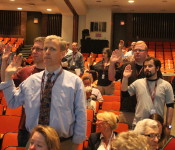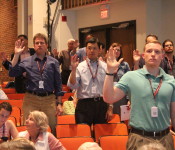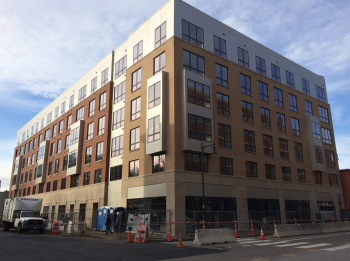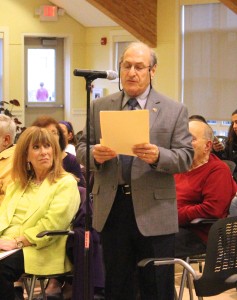Photo: Belmont Town Meeting.
Welcome to the first night of the 156 annual Belmont Town Meeting, Monday, May 4, 2014, the town’s legislative body in action.
So, what’s in store tonight? Likely we’ll get through the first nine articles in the warrant which includes a non-binding resolution on a solar power referendum (the debate on this could go one and on), a McMansion zoning article, storm water review, and other stuff.
And the meeting is on Belmont time, five minutes late.
7:08 p.m.: We’ve had the invocation, the flags were brought into the auditorium by the Boy and Cub scouts, the Pledge of Allegiance and the singing of the National Anthem by the Belmont High A Cappella. Very nice.
7:15 p.m.: I wonder when the Town Meeting will be comfortable with electronic voting that we don’t need a demonstration. I’m guessing a few more decades.
7:20 p.m.: New and recently re-elected members are given the oath of office by Town Clerk Ellen Cushman.
7:25 p.m.: Town Moderator Mike Widmer telling the members about the new rules; five minutes per speaker, one question and a follow up question, and direct questions through the moderator.
7:28 p.m.: Two proclamations to a pair residents “beloved by Belmont,” said Selectmen Chair Sami Baghdady; Anne Allen and Bob Dally.
7:35 p.m.: So we’re off – time to hear the order of the motions. The first nine articles will be debated in May, “hopefully within the first two nights,” said Baghdady.
“I am very upbeat on Belmont,” said Baghdady.
Anne Paulsen is giving an update on the new Underwood Pool. Everything is swimmingly. “Work is going on in a feverous pace” so the pool can be completed by August for a “short season.” So get passes at a discounted rate at the Recreation Department.
7:42 p.m.: Housecleaning articles up first.
7:44 p.m.: Up is Article 3, amending the Storm Water Management and Erosion bylaw to allow more updated rainfall data to apply to the bylaw. But the Conservation Commission uses the old data, which would be a mess as half the town would be using different data. The amendment would allow the ConCom to use the new data, while asking the Board of Selectmen to use the new data set. With a few questions, the article is adopted, with a single no vote.
7:57 p.m.: Article 6, the citizens petition to control the building of McMansions in the Shaw Estates neighborhood. You can read what the beef of the residents here. Basically, the residents are seeking to limit the height of residential properties to 32 feet to the mid-point. This will sunset on June 30, 2016 unless extended at the next Town Meeting. The people, now called the Belmont Citizens for Responsible Zoning, live in single-family residence, hopes this moratorium will begin a discussion on these “oversized” homes that tower over neighboring homes, crowd out sunlight, and undermines the character of the “Town of Homes.” The current zoning bylaw requires existing homes to obtain a special permit but not for new construction.
Stephen Pinkerton, Pct. 7, said the town faces acceleration oversize construction, especially his neighborhood. Five new McMansions have gone up in the past few years. The before and after pictures of what was there and what is replaced has Town Meeting buzzing, especially the new house on Betts Road currently under construction. “Our neighborhood has been transformed,” said Peg Callahan, who is presenting the petition.
Pinkerton shows that new construction under current bylaw will allow the total height to be 40 feet tall. The 32 feet mid-point “is a compromise” so not to be overwhelming. Callahan said if approved, the new group will meet with Planning Board to construct town-wide limits. A good cheer at the end.
Jim Stanton, Pct. 3, said since the town approved a series of actions in the General Residence district (precinct 3 and 4), one argument against the moratorium is economic harm to seller and developers, but it turns out only the developers reap the great profit when a McMansion is built rather than a more sensible sized house.
Price Armstrong, Pct. 7, asked if the town as a town-wide master plan to come to these goals. He said Cambridge, Lexington and others have such a comprehensive plan. Baghdady said there was one five years ago (but that was killed – tabled – at the 2010 Town Meeting).
Bob Kennedy, Pct 3, said he lives in Kendell Garden, a neighborhood of small homes, and he was effected when a McMansion was built there. Why would it not be better that the entire town be placed under the neighborhood, because then developers will go to other neighborhoods to beat a town wide change in the bylaw. Selectman Mark Paolillo said you can’t change the amendment but he’s worried about this. Mike Battista, chair of the Planning Board, said even if a town-wide bylaw is not approved, this moratorium can be extended.
Marty Cohen, Pct. 3, said that this is a “wake-up call.” “Belmont needs a zoning bylaw that’s good for Belmont.”
8:33 p.m.: a voice vote on the article: clearly adopted to the moderator, but why not an electronic vote? And the vote is: 238 to 24.
Wow, only a half an hour to go thorough that amendment.
8:38 p.m.: Next up is Article 7 which is related to the rezoning of General Residences district which passed articles to give special tools to the Planning Board – special permits being one – to make for better housing that is consistent with the neighborhood. Planning Board member Liz Allison said the Board would like another tool. Under the current bylaw, the developer can build a big two-family with a special permit. So this amendment would allow the board to approve a developer with a large lot, 8,000 sq-ft and 90 feet of frontage, to build a pair of single families.
8:46 p.m.: And the fire alarm goes off! And off we go to the parking lot!
9 p.m.: And we are back! That was delightful. I understand members who left through the music room were serenaded by a chorus.
Now back to the article; the proponents are looking to “bring back the charm” of the single family (with limits to allow green space between the two buildings) back to the GR zone, said Joseph DeStefano of the Planning Board.
Questions? Several interesting questions on position of the front door, hypothetical events, and other issues. The question is called and debate is ended. The vote on the article (requires 2/3 vote since it’s a zoning bylaw) is 235 to 10 and the article is adopted.
9:35 p.m.: Moderator Mike Widmer asks if the meeting will want to begin Article 9, the solar power non-binding resolution, debate it for an hour and suspend until Wednesday. Yes, says the meeting.
This is Article 9, the citizens petition on solar power. The Board of Selectmen voted 2-1 to oppose the article. (Jim Williams the lone yes vote). Roger Wrubel, Pct 5, speaks for the petition. Wrubel said this article will bring solar power to a wider audience. This isn’t really about a ballot question, but rather a request for the public utility, Belmont Light, not discriminate against solar owners with special fees. Wrubel explains net metering, required by most utilities which, it turns out, intensifies solar usage. Wrubel said he wants Belmont Light to provide the same retail net metering as 30 of 40 communities. How many Belmont household have solar arrays? 20. Not much. Wrubel said Belmont Light’s policy has punished residents who want to use solar.
Ralph Jones, Pct 3, introduces Patty DiOrio, of the Belmont Municipal Light Advisory Board – which wrote the draft plan that is no longer being used, who said that the solar advocates will get a subsidy from other users. There is no discrimination to solar users, said DiOrio. This is about keeping local control on how the utility determines how to pay for solar power.
Jones said its best to wait on the issue so Belmont can create its own standards. He said there are people at Town Meeting who are itching to do battle over the issue. “They want a fight to the death … a fight to the pain.” He proposes this amendment be postpone until a later date to allow emotions to calm down.
Fred Paulsen, Pct 1, said its critical Belmont has a strong independent utility. He said with the state task force on solar net metering coming out with a report, the Light Board (it’s made up of the Board of Selectmen) will come up with it’s own standards.
Suddenly the issue is getting people hot under the collar. Paul Roberts, Pct 8, is scolded rather loudly by the moderator for moving beyond the narrow scope of the question.
Dan Nolan, Pct 2, wonders how long is “indefinite” as in “indefinitely postponed.” Baghdady said the draft buy back plan is off the boards and the Light Board will come up with a plan for Belmont “sooner than later.”
When asked by a speaker if DiOrio has a conflict of interest as she is employed by National Grid, a large utility that supplies Belmont Light with energy, she and Jones said no, this was irrelevant to this measure. For some reason, this is the final straw for Wrubel who goes to the speakers podium and accusing people of “being afraid” to discuss the article and the subject. Calls from the members ring out that Wrubel is “out of order.” Moderator Widmer has heard enough and sends Wrubel back to the bench.
Julie Crocket, Pct. 5, and Phil Thayer, Pct 6, support the measure and requests that the debate continue.
Bob McLaughlin, Pct. 2, questions the entire article, saying it’s far too “squishy” to vote on because it advises the town’s state legislators to vote for legislation that doesn’t exist.
Then, of all people, Don Mercier, Pct. 8, asked that the questioned be moved, needed a 2/3 majority, it got it. Town Meeting is not in a mood to spend the rest of the night and Wednesday in a debating tournament. Article 9 is voted down by a healthy margin.
10:20 p.m.: Town Meeting will reconvene on Wednesday, May 6.






